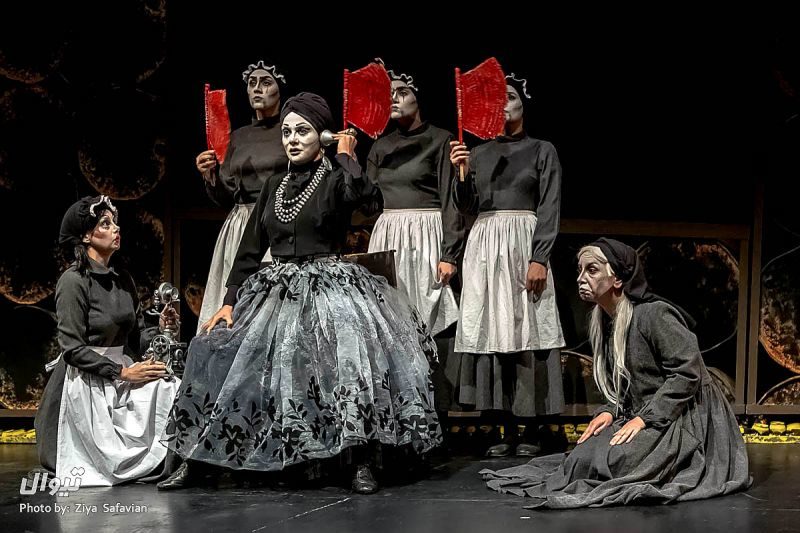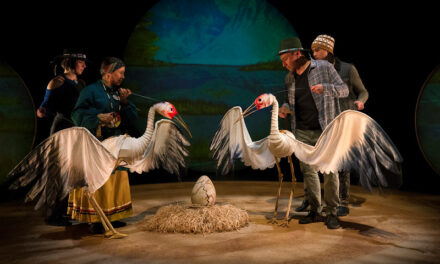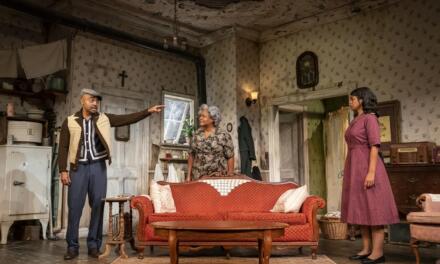Mrs. Pistols is an outstanding example of an Iranian play that meets the intellectual and aesthetic expectations of serious theatre audiences. Mohammad Amir Yār Ahmadi, the playwright, and Shahāb-el din Hosseinpour, the director, created the script and performance in a way that led the audience both to identify with the subject of the play and characters and to enjoy the form. Employing effective and controlled humor, a precise and well-thought-out mise-en-scène, fast-paced performances, a musical style not synchronous with the time and place of the narration, and exaggerated makeup, the play commanded the audience’s attention to the end.
The play narrates the story of the decline of Akhtar-ol Saltaneh, a provincial aristocrat who is connected to the central government via her aunt, the queen. The king’s divorcing of the infertile aunt at the beginning of the play introduces the audience to Akhtar’s fall from her social and political status. The title of the play, Mrs. Pistols, refers to her inherited antique pistols, which she values greatly and cherishes. She is a powerful woman who has traveled to developed European countries and has the ideal of bringing modern order to the traditional town she lives in. Her high social and political influence due to her connection to the royal court gives her license to walk around town and punish the unruly and law-abiding alike by shooting them. The pistols symbolize her inherited power. With the aunt’s divorce, and hence Akhtar’s divorce from the central government, the governor decides that the law of disarmament–from which, due to her political connections, she has been exempt–should now apply to her. Now she is expected to surrender her most valuable family heritage to the governor–in other words, to relinquish her social and political power. The action of the play involves her conflict with the governor over the surrender of the pistols.
Different indoor scenes reflecting Akhtar’s family and their relations show them as dysfunctional and sterile. She’s been married five times, the result of which is her intellectually challenged daughter, Māh Monir, the sole legal heir to her mother’s wealth and power. Akhtar’s husband, Hooshang, a handsome young man, and the ex-apprentice to the town tailor has married her, now an old woman, to get his hands on her wealth after she dies. Her son-in-law, Madi, is a ruffian who has married her daughter for material expectations. Māh Monir’s belly has been protruding like that of a pregnant woman for ten years, and she even has food cravings but does not deliver her baby, a symbolic reference to the family’s sterility. Considering these facts, Akhtar’s decline has begun years before her aunt’s divorce.
Akhtar cannot bring herself to hand over the pistols and decides to negotiate the issue with the town’s governor. The corrupt government official agrees to exempt her from the disarmament law on the condition that she relinquish her most precious piece of land to the government, but she rejects the deal. In the end, Akhtar is forced to surrender her pistols and her most beautiful maid. Surrendering the pistols means giving up her power and the ideal of the town’s modernization. As soon as she is dispossessed of the town’s affairs, the town returns to its traditional disorganized state. This proves that cultural change is not possible under the gun.
To depict a timeless story, the playwright creates an imaginary setting which seems simultaneously old and modern. The language, lifestyle, and names of characters remind the audience of Iran’s historical past of around a century ago. Meanwhile, the script and the performance employ a variety of techniques and strategies that distance the play from its historical appearance.
The sharp humor in the dialogue and action and the exaggerated makeup give the performance the quality of the grotesque, which is the director’s favorite genre. The formal language which the playwright has employed so masterfully and gracefully belongs to the Qajar period, [1] which in combination with the actors’ fast-paced actions and brisk body movements, deviates from its historical context. The costume design follows a pre-modern Western style. Live music, which is performed between and during the scenes, is also for the most part modern Western. It plays an important role in enriching the play’s texture, energizing the action and giving the story a modern quality. In employing the Kabuki style, a traditional Japanese dramatic form, in the actors’ masklike makeup and quick and jerky body movements, the inventive director doubles the grotesque effect. The actors’ graceful body movements show their considerable preparation and mastery. The stage set is quite modern, composed simply of some rusty barrels piled up to represent seats and beds, and crushed empty cans on the floors showing the walls of Akhtar’s house, all implying the rusty and hollow truth of her existence and counteracting the historical context. Through a combination of old and modern signs, the play seems to cover the 20th century onwards, during which different modernization projects have been executed in Iran.
In the end, Māh Monir does deliver: but instead of a baby, a pile of crushed walnut shells falls from under her skirt, a grotesque scene which puts an end to Akhtar’s self-delusion and futile ideals.
Mrs. Pistols, the winner of the Best Director, Best Actress, and Costume Design awards at the 34th Fadjr International Theater Festival in Iran was on stage in October and November 2017, at the Paliz Theater, a nongovernmental venue in Tehran.
Notes
1. The Qajar dynasty was an Iranian royal dynasty of Turkic origin, specifically from the Qajar tribe, which ruled Persia from 1785 to 1925 (https://en.wikipedia.org/wiki/Qajar_dynasty).
This post was written by the author in their personal capacity.The opinions expressed in this article are the author’s own and do not reflect the view of The Theatre Times, their staff or collaborators.
This post was written by Baharak Sahami.
The views expressed here belong to the author and do not necessarily reflect our views and opinions.


















